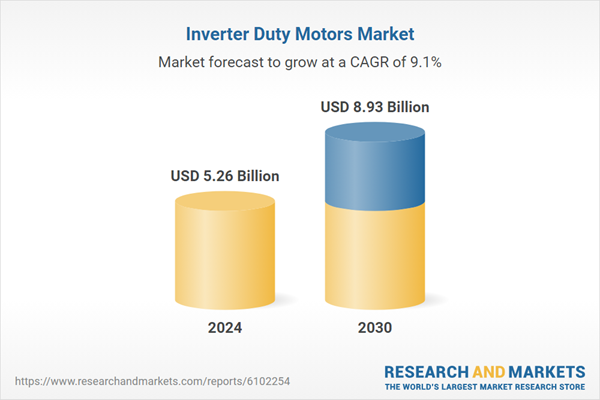Speak directly to the analyst to clarify any post sales queries you may have.
10% Free customizationThis report comes with 10% free customization, enabling you to add data that meets your specific business needs.
Inverter duty motors are constructed with reinforced insulation, improved thermal capabilities, and vibration resistance to handle the electrical stresses associated with VFD operation. These motors are essential in applications that demand variable speed control, energy optimization, and longer equipment lifespans, making them integral in industries such as oil and gas, HVAC, water and wastewater treatment, manufacturing, power generation, and food processing. The transition to energy-efficient systems and the global shift toward intelligent industrial operations are key factors driving the adoption of inverter duty motors across both developed and emerging economies.
Key Market Drivers
Increasing Demand for Energy-Efficient Motor Systems
The growing global emphasis on energy conservation and operational efficiency is significantly driving the adoption of inverter duty motors. These motors, when paired with VFDs, allow for precise speed and torque control, which helps minimize energy consumption across variable load conditions. Sectors such as manufacturing, HVAC, and water management are adopting these systems to reduce energy costs and support environmental compliance. Inverter duty motors not only improve system performance but also align with international regulatory frameworks promoting sustainability. Government incentives and industrial policies focused on reducing carbon emissions further encourage industries to transition from traditional fixed-speed motors to high-efficiency, variable-speed alternatives.Key Market Challenges
High Initial Investment and Cost Sensitivity Across End-Use Sectors
Despite their long-term energy savings and operational advantages, the high initial investment required for inverter duty motors presents a notable challenge to widespread adoption, especially in cost-sensitive industries. These motors incorporate specialized components and insulation to support VFD compatibility, leading to higher procurement and installation costs compared to standard motors. Small and medium enterprises, particularly in developing economies, often find it difficult to justify the upfront expenditure despite potential efficiency gains. Industries such as textiles, food processing, and light manufacturing may continue to rely on conventional systems, delaying modernization efforts and constraining market expansion in lower-income regions.Key Market Trends
Integration of Industrial Internet of Things and Smart Motor Technologies
A major trend in the inverter duty motors market is the growing integration of digital technologies, including Industrial Internet of Things (IIoT) and smart motor systems. These advanced motors are now being embedded with sensors and connectivity tools that enable real-time monitoring of performance indicators like temperature, load, vibration, and energy use. Cloud-based analytics and AI-driven diagnostics support predictive maintenance and optimize motor operations, reducing unplanned downtime and extending equipment lifespan. The convergence of smart motors with automation systems, including SCADA and PLCs, is accelerating their adoption across industrial environments aiming to build intelligent and scalable infrastructure in line with Industry 4.0 initiatives.Key Market Players
- ABB Ltd.
- Siemens AG
- WEG S.A.
- Regal Rexnord Corporation
- Nidec Corporation
- Toshiba International Corporation
- Rockwell Automation, Inc.
- General Electric Company
- Kirloskar Electric Company Ltd.
- Schneider Electric SE
Report Scope:
In this report, the Global Inverter Duty Motors Market has been segmented into the following categories, in addition to the industry trends which have also been detailed below:Inverter Duty Motors Market, By Type:
- Totally Enclosed Fan Cooled (TEFC)
- Open Drip Proof (ODP)
- Explosion Proof
Inverter Duty Motors Market, By Power Rating:
- Low Voltage (Up to 1 HP)
- Medium Voltage (1-100 HP)
- High Voltage (Above 100 HP)
Inverter Duty Motors Market, By End-Use Industry:
- Oil and Gas
- Chemicals and Petrochemicals
- Power Generation
- Water and Wastewater Treatment
- Food and Beverage
- Pulp and Paper
- Mining and Metals
- HVAC
Inverter Duty Motors Market, By Region:
- North America
- United States
- Canada
- Mexico
- Europe
- Germany
- France
- United Kingdom
- Italy
- Spain
- South America
- Brazil
- Argentina
- Colombia
- Asia-Pacific
- China
- India
- Japan
- South Korea
- Australia
- Middle East & Africa
- Saudi Arabia
- UAE
- South Africa
Competitive Landscape
Company Profiles: Detailed analysis of the major companies present in the Global Inverter Duty Motors Market.Available Customizations:
With the given market data, the publisher offers customizations according to a company's specific needs. The following customization options are available for the report.Company Information
- Detailed analysis and profiling of additional market players (up to five).
This product will be delivered within 1-3 business days.
Table of Contents
Companies Mentioned
- ABB Ltd.
- Siemens AG
- WEG S.A.
- Regal Rexnord Corporation
- Nidec Corporation
- Toshiba International Corporation
- Rockwell Automation, Inc.
- General Electric Company
- Kirloskar Electric Company Ltd.
- Schneider Electric SE
Table Information
| Report Attribute | Details |
|---|---|
| No. of Pages | 185 |
| Published | June 2025 |
| Forecast Period | 2024 - 2030 |
| Estimated Market Value ( USD | $ 5.26 Billion |
| Forecasted Market Value ( USD | $ 8.93 Billion |
| Compound Annual Growth Rate | 9.0% |
| Regions Covered | Global |
| No. of Companies Mentioned | 10 |









